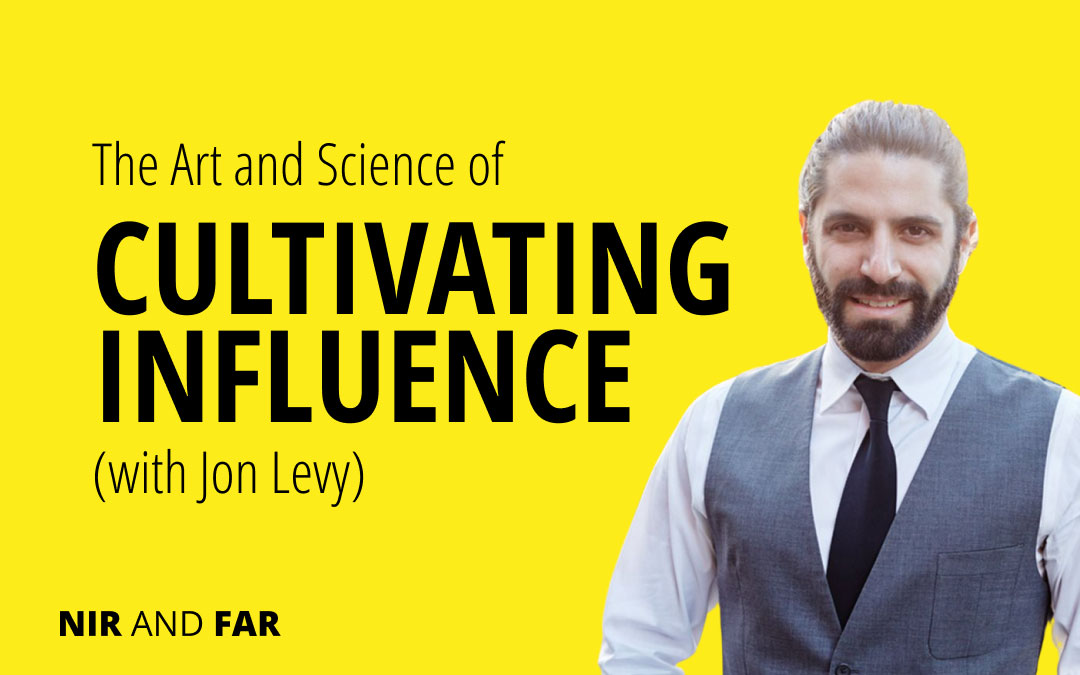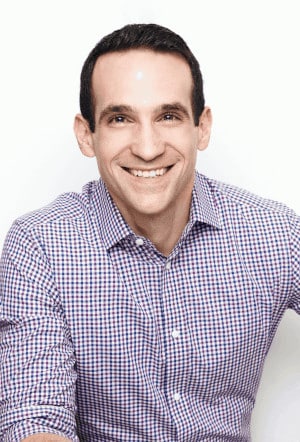Nir Eyal: Why did you write this book?
Jon Levy: This is going to sound super strange, but as the founder of “The Influencers Dinner” (see this TED Talk), I have made a career of having Nobel Laureates, Fortune 500 Executives, and celebrities cook me dinner, wash my dishes, clean my floors, and then thank me for it. In the process, I realized that the greatest predictor of success isn’t IQ or what college people went to. It is who we are connected to, how much they trust us, and the sense of community we share.
We all know these things are important, but as a behavioral scientist, I jumped into the research and found that most of the strategies that we use tend to reduce our success. In this book, you won’t get a single piece of networking advice. Instead, you will learn the science and stories of how to create deep and meaningful relationships with the people you admire most and the ones that could have the biggest impact on the things you care about.
I wrote this book because I wanted people to connect and to succeed.
NE: You’ve done some fascinating research. From what you’ve learned, what surprised you the most?
JL: There are two things that I found funny:
- People absolutely hate networking: Research from Harvard found that our implicit association to networking is feeling dirty. We will do just about anything to avoid it. Meanwhile, we love making friends. We just don’t realize what it is that will make people want to be our friends. That’s one of the things my book breaks down.
- Stop spending money: It’s near impossible to win people over with business dinners or gifts. Instead, the opposite is true. This is known as the IKEA effect, people care more about their IKEA furniture because they had to assemble it. It turns out, people will like us more when they put effort into the relationship. So we need to give them the opportunity to do that.
NE: What lessons should people take away from your book regarding how they should design their own behavior or the behavior of others?
JL: If you have ever been to Walt Disney World, you will notice there is a 23-minute monorail or boat ride from the ticket counter to the entrance of the Magic Kingdom. This isn’t to build anticipation, but rather to deal with buyer’s remorse. Apparently, Disney realized that if they wanted people to spend money and be happy, they should get over their buyer’s remorse first and it takes about 23 minutes for them to do that.
Disney designs a journey for guests that takes into account our biases, mechanics, and emotions so that we leave happy, and their business succeeds. The big takeaway is that when you are aware of your mechanics ahead of time, you can design a journey around them.
NE: Writing a book is hard. What do you do when you find yourself distracted or going off track?
JL: There is a very frustrating trick I use based on incomplete work. At times, I will intentionally not finish the paragraph I’m working on, even though I know what I want to say. Our brains tend to obsess when things are incomplete. As a result, it gets me really excited about getting back to writing the next time I’m at my computer.
When I know I have to meet a deadline, I will hire an editor off of Upwork to work with me in real-time and make sure I stay focused and productive. It can be easy to justify pushing off my own schedule, but when I am paying another human being to be there with me, it’s like having an appointment with a trainer at the gym–you are more likely to show up and get in the work you need.
NE: What’s one thing you believe that most people would disagree with?
JL: The Mona Lisa is not as deserving of its status as the greatest painting of all time!
Before 1911, no one had heard of the Mona Lisa. It had hung in the Louvre among a collection of other paintings, but on one Monday while the Louvre was closed, a man walked into the Renaissance section, simply ripped off the smallest painting from the wall that he could find and walked out with it. Over the next three years, the painting reached global attention as newspapers printed photos of the work, and high rewards were offered.
Thousands of people stood in line just to see the empty spot on the wall. When it was finally returned, France celebrated. But it was not the quality of the painting that made it spectacular, but the legend it had garnered. This is known as the Mere Exposure Effect. The more we are exposed to something, the more we tend to like and trust it. People think the Mona Lisa is the greatest painting simply because it is the painting they have seen the most.
NE: What’s your most important good habit or routine?
JL: I don’t evaluate the quality of my decisions based on the results.
When we succeed we think we made good decisions, and when we fail we tend to think we made bad ones. But the two are often unassociated. You can make terrible decisions and win, and great decisions and lose. What matters is the quality of our thinking, not if we were lucky.
To quote one of the greats:
“It is possible to commit no mistakes and still lose. That is not a weakness; that is life.” Captain Jean-Luc Picard
NE: Are you working to change any bad habits?
JL: I have tons of bad habits, I think they are a byproduct of being human. Right now, I am trying to tackle my breathing. It turns out that as a mouth breather, I am doing terrible things to my body. To deal with this, I’ve hired a level three Wim Hof breathing instructor. These are the people who go hiking in the snow just in their underwear. They have some of the most advanced breath training in the world.
I believe if you are serious about something, you should find a coach and develop a practice around it. I train with a resistance breathing mask four to five times a week. I tape my mouth when I sleep so I only breathe through my nose. And I do private classes with my coach. What is incredibly clear is how uncomfortable it can be to improve bad habits, but there is an incredible satisfaction from seeing the improvement from week to week.
NE: What one product or service has helped you build a healthy habit?
JL: Before sheltering at home, I fell in love with ClassPass. I found it hard to find fitness classes when I travelled or add variety to my routines so they didn’t get boring. Having a fairly priced place to find fun, new, and interesting fitness activities helped me get back into shape and helped me maintain the habit.
NE: What’s the most important takeaway you want people to remember after reading this book?
JL: Fundamentally, the most universal strategy for success, regardless of what success means to you, is creating meaningful relationships with the people who can have the greatest impact on the things you care about.
A few fun facts:
- Living a long life: The greatest predictor of human longevity is not exercise or eating organic but #2 close social ties (having friends) & #1 social integration (being part of a community).
- Business success: You can correlate company stock value, employee sick days, and profitability to the level of oxytocin in employees bloodstream.
More than anything I hope people will reach out to others, and make friends, as we have become far too isolated during this pandemic.
Related Articles
- Schedule Maker: a Google Sheet to Plan Your Week
- Habit Tracker in Google Sheets – Free Template
- A List of 20 Values [and Why People Can’t Agree On More]
- Timeboxing: Why It Works and How to Get Started in 2024
- An Illustrated Guide to the 4 Types of Liars
- Hyperbolic Discounting: Why You Make Terrible Life Choices
- Happiness Hack: This One Ritual Made Me Much Happier

